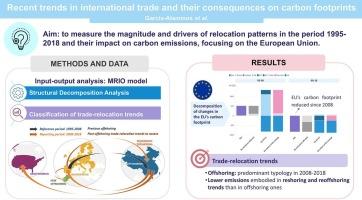Recent global value chain reconfiguration: drivers and consequences on EU carbon footprint
IF 6.3
2区 经济学
Q1 ECOLOGY
引用次数: 0
Abstract
The vulnerability of global value chains is in the spotlight due to recent geopolitical tensions and shocks with a worldwide impact. Vulnerability in trade terms is often linked to distance from the suppliers, high concentration of imports, or not-shared values, implying several logistic risks. As a result, economies seeking higher resilience in their value chains are considering new sourcing strategies, like backshoring or nearshoring. Such trade-restructuring schemes need to consider sustainability to be effectively resilient, but, at the same time, they are drivers of changes in global carbon emissions.
This paper aims to measure the magnitude of those relocation patterns and their impact on carbon emissions, focusing on the European Union (EU). For this purpose, we use an environmentally extended multiregional input-output model to calculate global emissions' trends from 1995 to 2018 and to identify different trade-relocation patterns, quantifying their carbon content. We also perform a structural decomposition analysis to divide the changes in the EU's carbon footprint according to different drivers.
Our results show a change in global emissions evolution from 2008 onwards, with emerging trends of global value chains reconfiguration showing a more vital role of environmental concerns. We also find that reshoring and reoffshoring are less emission-intensive than offshoring. In the EU's context, its footprint has been reduced since the 2008 crisis, mainly due to lower emissions intensities and technical changes towards cleaner ways of production. In contrast, the geographical shift of suppliers contributes to the growth of emissions in the whole period.

近期全球价值链重构:欧盟碳足迹的驱动因素及后果
由于近期地缘政治紧张局势和具有全球影响的冲击,全球价值链的脆弱性受到关注。贸易方面的脆弱性通常与与供应商的距离、进口的高度集中或不共享的价值有关,这意味着若干物流风险。因此,在价值链中寻求更高弹性的经济体正在考虑新的采购策略,如回流或近岸。这种贸易结构调整计划需要考虑到可持续性具有有效的弹性,但与此同时,它们也是全球碳排放变化的驱动因素。
本文章由计算机程序翻译,如有差异,请以英文原文为准。
求助全文
约1分钟内获得全文
求助全文
来源期刊

Ecological Economics
环境科学-环境科学
CiteScore
12.00
自引率
5.70%
发文量
313
审稿时长
6 months
期刊介绍:
Ecological Economics is concerned with extending and integrating the understanding of the interfaces and interplay between "nature''s household" (ecosystems) and "humanity''s household" (the economy). Ecological economics is an interdisciplinary field defined by a set of concrete problems or challenges related to governing economic activity in a way that promotes human well-being, sustainability, and justice. The journal thus emphasizes critical work that draws on and integrates elements of ecological science, economics, and the analysis of values, behaviors, cultural practices, institutional structures, and societal dynamics. The journal is transdisciplinary in spirit and methodologically open, drawing on the insights offered by a variety of intellectual traditions, and appealing to a diverse readership.
Specific research areas covered include: valuation of natural resources, sustainable agriculture and development, ecologically integrated technology, integrated ecologic-economic modelling at scales from local to regional to global, implications of thermodynamics for economics and ecology, renewable resource management and conservation, critical assessments of the basic assumptions underlying current economic and ecological paradigms and the implications of alternative assumptions, economic and ecological consequences of genetically engineered organisms, and gene pool inventory and management, alternative principles for valuing natural wealth, integrating natural resources and environmental services into national income and wealth accounts, methods of implementing efficient environmental policies, case studies of economic-ecologic conflict or harmony, etc. New issues in this area are rapidly emerging and will find a ready forum in Ecological Economics.
 求助内容:
求助内容: 应助结果提醒方式:
应助结果提醒方式:


